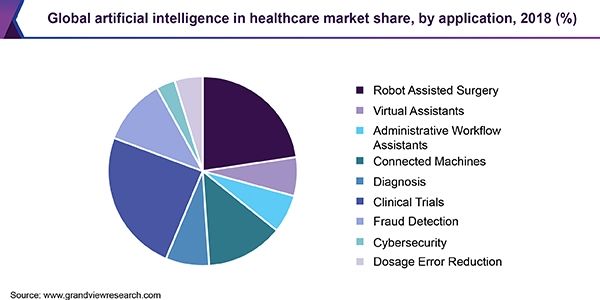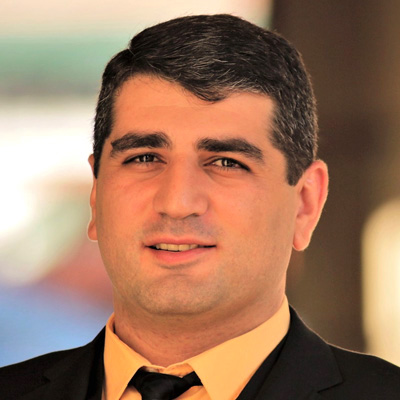Artificial Intelligence in the Field of Medicine
Many scientists believe that in a few years, AI will revolutionize every area of our lives. This is especially true for the field of healthcare and medicine. Some consider AI as a treat to humanity. In contrast, others see AI as a solution to save so many lives.

What Are the Three Different Levels of Intelligence, And How Do They Apply in The Field of Medicine?
According to Nick Bostrom, a Swedish-born philosopher at the University of Oxford and the author of the book “Superintelligence: Paths, Dangers, Strategies,” categorizes AI in three different levels:
1.Artificial narrow intelligence (ANI)
2.Artificial general intelligence (AGI)
3.Artificial superintelligence (ASI)
Artificial Narrow Intelligence
This type of AI refers to our present-day algorithm. It is the ability to perform a single task excellently. In medicine, ANI is used to recognize patterns in massive data sets.
Artificial General Intelligence
This type of AI refers to a machine’s ability to understand and learn any intellectual task like a human being. This type of AI is yet to be used in the field of medicine, such as AI robots or AI-based systems that are capable of performing surgeries on their own.
Artificial Super Intelligence
This type of AI refers to a machine’s understanding that can surpass its cognitive capacity. A famous example of ASI is the movie The Terminator. In medicine, ASI may help find the cure for deadly diseases with a 100% success rate.
What are the types of AI used in medicine?
Two of the most famous methods of AI algorithm in medicine are:
1.Machine learning
2.Deep learning
Machine Learning
Machine learning is the method where the algorithm learns from data. The more data the algorithm is exposed to, the better it becomes at doing its job. That’s why scientists expose the machine to tons of data so it can interpret, process, and analyze a specific task. The machine can identify patterns and make decisions without human intervention.
When discussing machine learning AI, it is essential to remember the data annotators. Data annotators are responsible for taking CT or MRI scans, drawing lines around tumors or pinpoint cells, or designing EKG strips. Data annotators perform this task for the machines to utilize the data.
Deep Learning
For complicated tasks and complex problems that require high dimensional data and automated feature extraction that are hard to define, such as spotting a tumor on a CT scan, scientists turn to a more advanced method called deep learning. A deep learning algorithm can study MRI images and analyze them.
Deep learning algorithms perform based on neural networks that try to mimic how the human brain functions, processes information, and makes decisions. Scientists have replicated the human brain in artificial neural networks, also known as deep learning. This allows the results to be more precise.
How is Artificial Intelligence Currently Helping in The Field of Medicine?
According to a report done by PwC, AI will contribute an additional 15.7 trillion dollars to the world economy by 2030. And the most significant impact will be in the field of healthcare. But, how is the field of medicine benefitting from AI at the moment?
Data management
AI collects and classifies vast sets of data. This can significantly improve query importance and accuracy.
Time-Saving
AI performs high-level computations that will take days for a human to solve. For example, an algorithm can go through millions of scans to detect an illness than a radiologist can in a day.
Easy Access to Medical Help
AI allows individuals to have virtual care-taker. Example: The app supported by the National Institutes of Health: AiCure. AiCure offers a profound view of human behavior that was previously only accessible via a care provider. The AI uses facial recognition and motion-sensing technology to confirm if a patient has correctly taken their medication from the user’s smartphone’s webcam.
Accurate Predictions
When a neural network is exposed to hundreds of data, the AI will predict precise outcomes.
Where is Artificial Intelligence Already Making a Difference?
AI is already making waves in many fields other than the field of medicine. Below are a few medical professions where AI is already making a difference.
Cardiology
Globally, the number one cause of death is cardiovascular disease. With the help of AI, patients can detect it and manage it more easily. Scientists from Google and Verily have created a machine learning algorithm that uses retina photographs to assess a person’s risk of cardiovascular diseases. Traditionally, doctors prescribe a blood test to analyze a patient’s cardiovascular risk. The study shows that based on an eye scan, the AI can predict the individual’s age, gender, blood pressure, and smoking status with very high accuracy.
Radiology
As mentioned earlier, AI can go through millions of data such as CT scans and MRIs to spot an illness during one day. That almost outperforms a radiologist’s lifetime labor. With the help of AI, radiologists will avoid human mistakes and bring out more accurate reports to improve workflow and patient care.
Dermatology
A study conducted by scientists in 2020 demonstrated that a deep learning machine could detect a malignant melanoma with up to 95% accuracy. On the other hand, the dermatologists who participated in this research accurately detected melanomas by 86%. In this case, too, a deep learning neural network outperformed an actual doctor in its profession.
Oncology
A great example of AI in oncology is IBM’s Watson. Watson’s algorithm generates treatment recommendations for cancer patients, and dozens of hospitals have already adopted this technology. However, some experts believe that Watson has a long way to meet high expectations and deliver more accurate results.
Will Artificial Intelligence Replace Real Doctors?
Those who fear that autonomous tools, machines, and algorithms will replace actual human beings can rest assured that it won’t be the case. AI and doctors will co-exist in harmony because AI is the most significant help and support physicians can ask for.
Table of Contents
- What Are the Three Different Levels of Intelligence, And How Do They Apply in The Field of Medicine?
- What are the types of AI used in medicine?
- How is Artificial Intelligence Currently Helping in The Field of Medicine?
- Where is Artificial Intelligence Already Making a Difference?
- Will Artificial Intelligence Replace Real Doctors?



